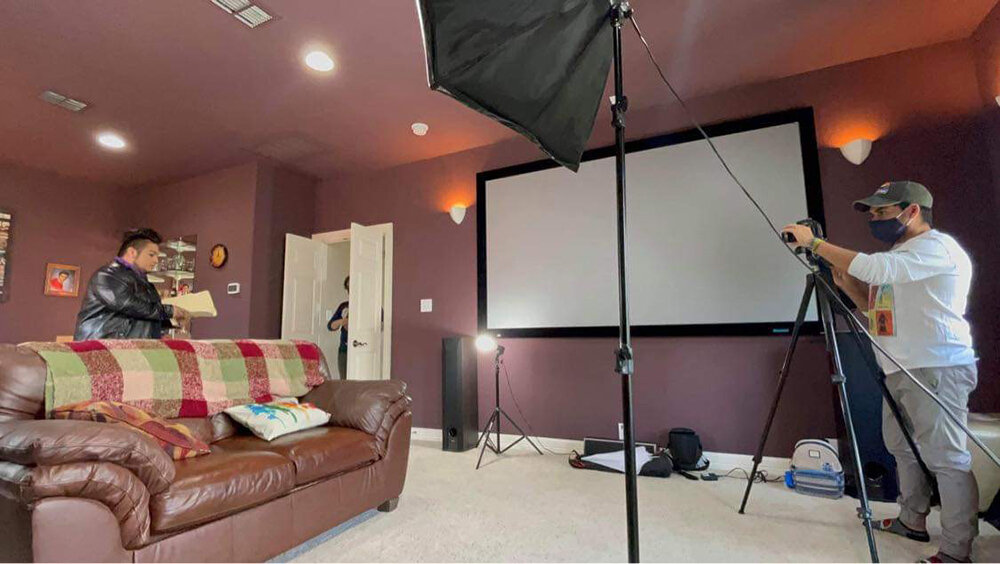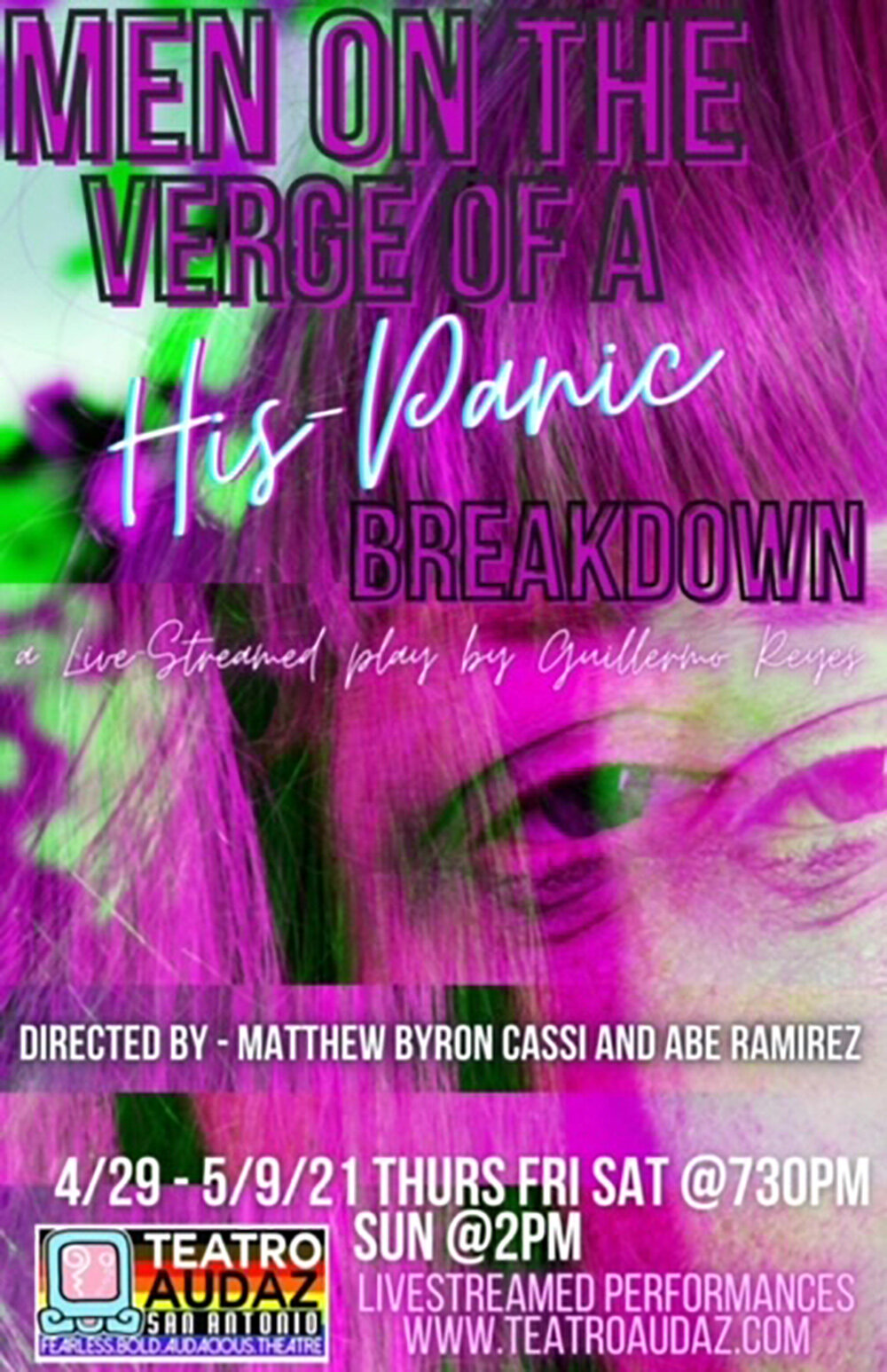Men on the Verge of a His-panic Breakdown Directors Discuss Machismo, Culture Shocks
May 5, 2021 - San Antonio
By Valeria Torrealba - Senior Reporter, San Antonio Sentinel
Teatro Audaz continues their 2021 Live-streamed and Online On-Demand season with Men on the Verge of a His-panic Breakdown, a series of comedic dialogues co-directed by Matthew Byron Cassi and Abraham Ramirez that explores the transcultural shock the Latinx community experiences when immigrating to the daunting U.S — a phenomenon also known as the “Hispanic” breakdown.
“Essentially, it just shows us the lives of these various men who are part of the LGBTQ community as well as the Latinx community,” co-director Ramirez said. “So you have some Cubano, some Puerto Rico, some Mexican — all varying in states of where they’re at in their LGBTQ community, or even their personal journey finding their place in this world of America, and culture.”
Machismo — the Spanish term for toxic masculinity and misogyny — is a prominent theme that sets the structure in Latinx households; a man is at the head of the house, whereas the woman tends to the children. It is a traditional structure that further propels the co-directors to break through those barriers and set any prejudices aside.
The play is bracketed by the misadventures of the naive Frederico, donned as "The Gay Little Immigrant That Could,” who arrives in Los Angeles during the first day of the 1992 riots and believes he's witnessing the filming of another Lethal Weapon sequel.
“We’re starting in 1991 when the LA riots first happened because of the Rodney King incident,” Ramirez said. “It’s kind of like that culture crash where you see how other people see America. It’s kind of an eye-opening world for him that this isn’t the world that was painted in the media, in the world that was painted from these men.”
Other characters in the production include Vinnie, a kept boy being asked to leave the home of his wealthy sugar daddy because he's turned 30; Paco, a Cuban restauranteur who was imprisoned by the Communists in Cuba for being gay and has now been exiled by his right-wing Miami family for the same reason; the Teacher, a stuffy, sexually repressed English-language instructor who abuses his Latino students when they can't learn properly the "language of Princess Di"; and La Gitana, a drag Flamenco dancer struggling with AIDS as he stages his final performance.
“Part of the reason why I love this play — I found it, of course, after my dissertation, which was annoying — I wrote one about machismo called Maricón, which is about just machismo and theatre community, how we don’t have many stories about the Mexican or the Latino LGBTQ man because in our world, that’s not a thing,” Ramirez said. “It’s very.. Puro macho — married to woman, that’s just not how it is anymore. It introduces this idea that these are just human beings. What crazy thing, huh?”
Lead director Cassi reflects on the identity crisis that a multitude of immigrants face once they step foot on U.S. soil. The abrupt change of customs and culture comes with a loss of one’s sense of self — one that is explored through the stories of these characters. A creative who has been in the industry for years, Cassi sought to tell the stories he could with the abundance of tools in his hands, aiming to learn more about other cultures and diversify the world of teatro.
Additionally, the production reflects on the cultural shift. Navigating a new country that differs largely from what a traditional Latinx household looks like consequently brings guilt and familial expectations to uphold, as detailed by Cassi.
“This is about that transcultural shock that a lot of immigrants have when they immigrate to America,” Cassi said. “There’s a lot of shock that comes with ‘Am I an American?’ the racism or prejudice sometimes they experience, but also the fact that the guilt that they have from their family and the expectations their family have once they get here. This follows gay immigrants and their experience of what it’s like to immigrate to America and the transcultural shock, or what it takes to be a gay Latino in America, and how that process is different, the experience of getting here is different for each person.”
While theater has been around for centuries and the same common tropes of love, loss, tragedy and more have been brought to life, Cassi and Ramirez set out to tell the stories of a marginalized community that is often never explored. Hidden in the shadows of Shakespeare’s legacy lies the stories of the gay community, communities of color and other often-silenced groups that both directors strive to highlight.
“There are a lot of hundreds of millions of stories, even just from the gay Latino community, that could fill up three more complete works of William Shakespeare,” Cassi said. “But yet in the theater world, we seem to be telling the same 50 stories, and I’m tired of telling the same 50 stories. I have an opportunity and I’ve got the skills to tell other stories.”
The three-man play destigmatizes the commonality of being both gay and a Latino man.
“You can expect to see some real-life people. People that they probably know, people that they have in their family, people that they see at work, people that they interact with — human beings just going through the emotion that everyone does, that humanizes and equalizes everyone,” Ramirez said.
In order to further reflect and represent the Latino community, Teatro Audaz sought out two more actors to partake in the original one-man show.
“This is originally a one-person show. So one actor played all the characters, but in order to give more Latino actors some opportunity, Teatro Audaz decided to cast three actors to do these roles,” Ramirez said. “Two of them are recorded following guidelines, and those scenes will be intermittent with this live actor who will be on stage at the public eye.”
The co-directors have navigated production during the pandemic, finding creative and safe ways for their actors to follow CDC guidelines and continue to work on the show. Opening night for the duo was an underwhelming feat — what normally ends with cheers and applause instead concluded with an empty theatre as show-watchers admired their screens in the comfort of their homes.
“Normally, there’s the buzz of the lobby, there’s people in the audience, the excitement, you give out cast letters, the whole cast is there — and it’s just this whole huge build up in the payoff and there’s a cast party and it’s amazing… and this is like, I showed up, there were two people in the theater with my actor,” Cassi said. “No applause, we were done, and I was home by 9:30. It was so weird and different.”
Men on the Verge of a His-panic Breakdown humanizes and highlights the experiences that come with being a gay Latino man in a new country that dismantles the rigid household and cultural structures implemented in the Latinx community. With each story reflected in the production, co-directors Ramirez and Cassi have trudged through the pandemic and put together an amalgam of stories that affect the people within our own communities.
“This process with Abe and Laura and Teatro in general… it’s just been fantastic. I would not have been able to do this without having Abraham in my co-pilot seat, because it’s just been a joy,” Cassi said. “He’s just as part of this production as I am, or as anybody else is.”
The show will continue to run virtually through May 9. Tickets can be purchased here.
Valeria Torrealba is an opinions columnist and public relations assistant at the University Star, a student publication of Texas State University. Email her at reporter@sasentinel.com


